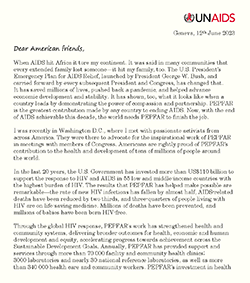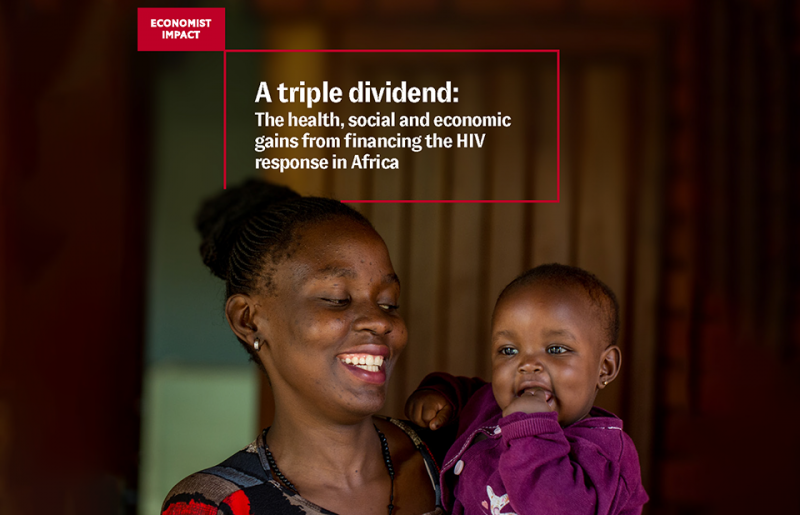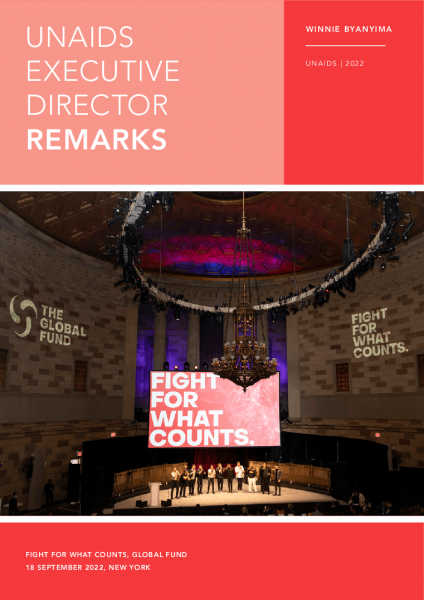NEW YORK/GENEVA, 28 September 2022—During the high-level week of the 77th session of the United Nations General Assembly leading African Ministers of Health joined UNAIDS, PEPFAR, global health institutions and partners in New York in rallying to sustain their commitments to end AIDS and accelerate their response to current and future pandemics. The high-level side event on “Political Leadership in the HIV Response”, highlighted continued progress on combating HIV in sub-Saharan Africa, which has been largely sustained despite the added challenges of the COVID-19 pandemic.
Ambassador Dr. John Nkengasong, United States Global AIDS Coordinator and Special Representative for Health Diplomacy, who was celebrating his 100th day in office said, “The HIV response has defined global health for 25 years. We have made remarkable progress, but we still have remarkable challenges going forward to end AIDS. It is time to ask where we go from here. PEPFAR, the Global Fund and UNAIDS represent the best of humanity when we apply our minds to solving problems.”
Ambassador Nkengasong also took the opportunity to launch “Reimagining PEPFAR's Strategic Direction, Fulfilling America’s Promise to End the HIV/AIDS Pandemic by 2030”, which focuses on key priority areas including: health equity for priority populations including children, adolescent girls and young women, and key populations; long term sustainability; positioning platforms to not civil society front and centre; and leading with science.
“Our work continues with renewed urgency to accelerate our push to end AIDS by 2030,” said Winnie Byanyima, Executive Director of UNAIDS. “The actions needed to end AIDS are also key for overcoming other pandemics and for protecting ourselves against future threats. We can end AIDS by 2030. But the curve will not bend itself—we have to pull it down together.”
African governments were represented by Ministers of Health from Botswana, Côte d’Ivoire, the Democratic Republic of the Congo, Eswatini, Malawi, Rwanda and South Africa, and the Director of Public Health from Nigeria, speaking on behalf of H.E. President Buhari, and were joined by H.E. Neo Jane Masisi, the First Lady of Botswana.
The Minister of Health of Democratic Republic of the Congo, Jean-Jacques Mbungani, said, “Despite our many challenges, the Government made the fight against HIV a national priority. In one year, we increased our domestic funding for HIV from CDF10 billion to CDF15 billion, and from 2002 to 2020, we decreased AIDS-related mortality by 42%.”
The Minister of Health of Côte d’Ivoire, Mr Pierre Dimba highlighted the importance of integrating lessons from COVID-19 in the HIV response. “The COVID-19 pandemic showed how important it is to invest in health and enhance our focus on HIV,” said Minister Dimba. “We have reinforced our health systems and are reinforcing our network of community health workers to reach people most in need as well as working closely with the education sector.”
Rwanda has been investing in institutional reforms in the health sector and continues to increase its own domestic health funding. “For an effective management of domestic resources we created the Rwanda biomedical center which has a multifaceted approach,” said Daniel Ngamije, Minister of Health of Rwanda. “Rather than having individual programs for HIV, TB and malaria, we have created and financed a sustainable, integrated system.”
Senator Lizzie Nkosi, Minister of Health of Eswatini, expressed appreciation of the partnership with donors and technical partners as key to the country’s success in the HIV response.
Minister Nkosi used the event to announce impressive new results in Eswatini’s efforts to end AIDS. “Today I announce that Eswatini has reached the epidemic control and the 95-95-95 targets,” said Minister Nkosi. “We have committed significant resources for HIV, which we will continue, in spite of COVID-19 and other pandemics. However, we couldn’t have reached this success without PEPFAR, UNAIDS and the Global Fund and so many other partners.”
The Minister of Health of Botswana highlighted the remarkable results Botswana has achieved and recognized the strong continued support of partners in Botswana’s progress to end AIDS. “Partners have contributed a lot to our achievements. In the early days our population was about to be wiped out by HIV, but last year we celebrated surpassing the 95-95-95 targets – that would not have been possible without sustained political leadership at the highest levels and the long-term partnerships we have,” said Minister Dikoloti.
From South Africa, the country with the world’s largest HIV epidemic, Minister of Health Joe Phaahla called for accelerated momentum to end AIDS, and the urgency of halting HIV incidence, particularly in young people in South Africa. “We have reduced the incidence of HIV by over 45%, we now have 5.2 million people on HIV treatment, and we launched our HIV strategy with a focus on young people,” said Minister Phaahla. “Going forward, our focus will be on integrating programs—lessons which we have learned through COVID and HIV. When you’re under pressure to save lives, our key is integration—political leadership to mobilize leaders in all sectors, health workers and community health workers–bringing them onboard, and to maintain the momentum.”
Reading a statement from H.E President Buhari of Nigeria, Dr Morenike Alex-Okah, Director of Public Health for Nigeria highlighted the call to end paediatric AIDS, “I reiterate the Government of Nigeria’s full commitment to the Sustainable Development Goals and other international and regional initiatives towards ending AIDS by 2030, and to addressing current and future health emergencies. As a demonstration of commitment, my government will convene African leaders and our international partners in Abuja in November 2022 to launch the Global Alliance to end paediatric AIDS by 2025.”
Loyce Maturu from the Global Fund Advocates Network in Zimbabwe spoke about gaps in the HIV response. “We know that we haven’t done enough in the management of HIV in children, and to prevent HIV among adolescent girls and young women. We have to look at psychosocial support, mental health, and viral load monitoring, which have been missing when it comes to community engagement. We need to focus on HIV management at the community level, empower community-led monitoring, support families and strengthen community systems.”
Peter Sands, Executive Director of the Global Fund to Fight AIDS, Tuberculosis and Malaria expressed his appreciation for the support to the Global Fund at its 7th Replenishment which mobilized US$ 14.2 billion, “This is a great opportunity to say thank you to everyone who pledged contributions to the Global Fund, and particularly the implementing countries which have stepped up enormously,” said Mr Sands. “One of the great strengths of the HIV response was its relentless focus on outcomes, saving lives and reducing infections. One of the things we learned with COVID is that we have got to get smart at making investments that can serve multiple needs at once. A broader approach for health systems that can fight multiple diseases and cope with future threats.”
Dr Matshidiso Moeti, the World Health Organization’s Regional Director for Africa, highlighted the need for governments to pick up the pace to end AIDS in Africa. “This is a fantastic convening of leaders who will play a key role in ending AIDS in Africa,” said Dr Moeti. “With HIV, we have learned many lessons. Inequities continue to be a major factor in driving vulnerability to HIV and access to services. We can make the resources go further and achieve more results for HIV.”
Stéphanie Seydoux, France's Ambassador for Global Health concluded, “The time for implementation starts now. We know the way forward and that is country ownership, country investment.”
The event, “Political Leadership in the HIV Response”, was co-organized by UNAIDS and PEPFAR on the margins of high-level week of the 77th Session of the United Nations General Assembly in New York. The video of the event is available at: UNAIDS/PEPFAR High-Level Side Event.
PEPFAR
PEPFAR is the largest commitment by any nation to address a single disease in history. Managed and overseen by the U.S. Department of State, and supported through the compassion and generosity of the American people, PEPFAR has saved 20 million lives, prevented millions of infections, and helped transform the global AIDS response. The U.S. President's Emergency Plan for AIDS Relief - United States Department of State
UNAIDS
The Joint United Nations Programme on HIV/AIDS (UNAIDS) leads and inspires the world to achieve its shared vision of zero new HIV infections, zero discrimination and zero AIDS-related deaths. UNAIDS unites the efforts of 11 UN organizations—UNHCR, UNICEF, WFP, UNDP, UNFPA, UNODC, UN Women, ILO, UNESCO, WHO and the World Bank—and works closely with global and national partners towards ending the AIDS epidemic by 2030 as part of the Sustainable Development Goals. Learn more at unaids.org and connect with us on Facebook, Twitter, Instagram and YouTube.





